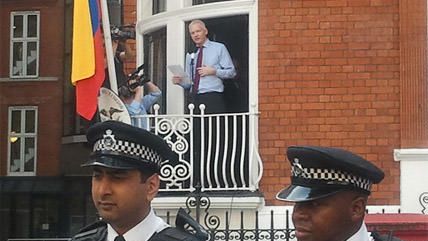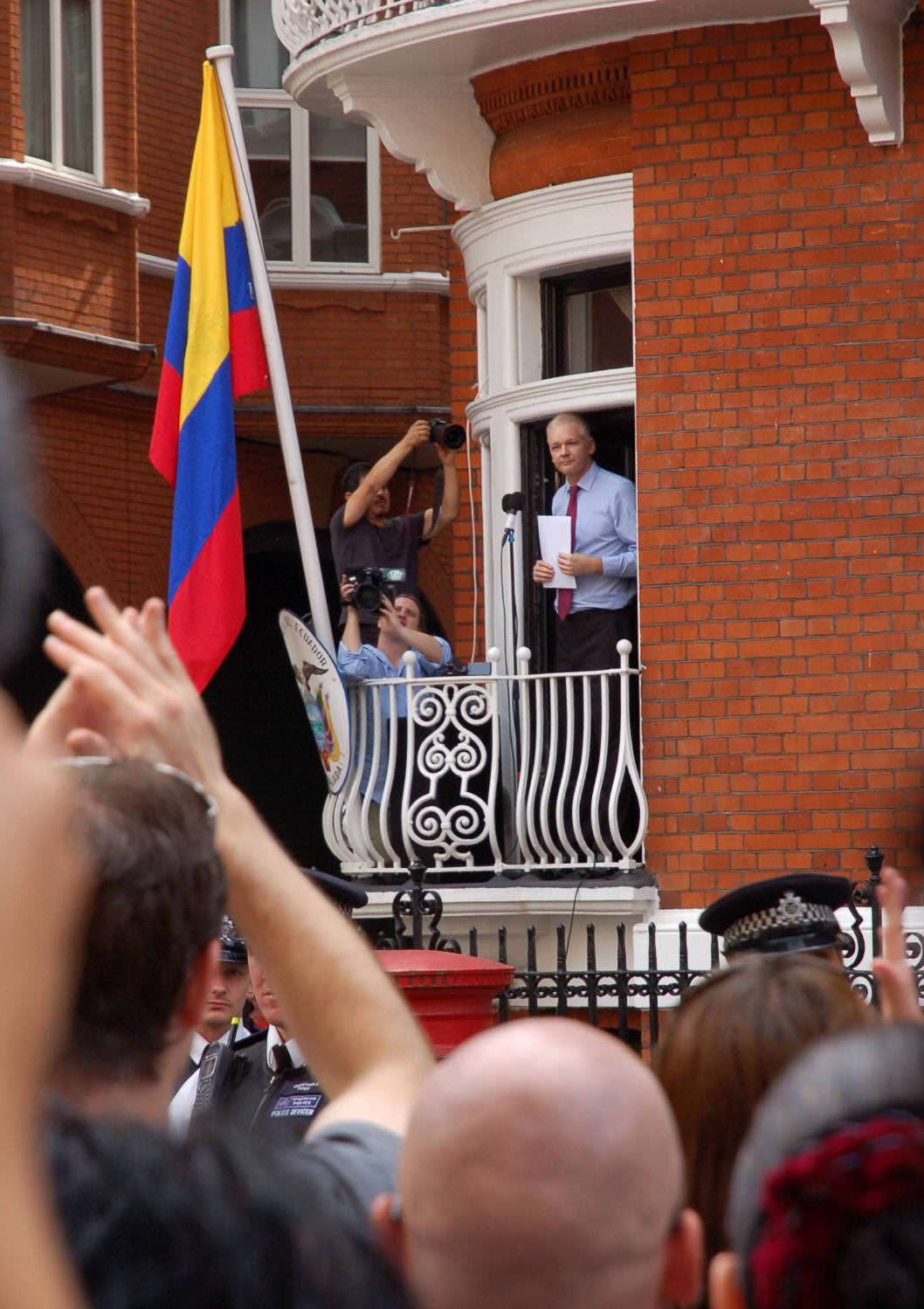Assange's Anniversary: Two Years Cornered, but Still World-Changing
From Iraq to SecureDrop, WikiLeaks remains an important tool for free speech, information, and action.


Happy anniversary, Julian Assange. Well, it's not happy per se, but tomorrow marks two years that he has spent stuck in the Ecuadorian embassy in London, which is surrounded at all hours by police. It is a good day to look back on the accomplishments of his information-leaking organization and reflect on how large an impact Assange has had and continues to have on issues of government, journalism, and whistle-blowing.
Assange is, of course, the founder of and force behind WikiLeaks. Based on the belief that "transparency creates a better society for all people," the organization's mission is to keep governments and corporations honest by disclosing their dealings. This doesn't gel with the powers that be, though. On top of the $10 million the London police have already spent monitoring Assange's sanctuary, the FBI is still investigating him, and the NSA is still on a "manhunt."
Unleashing an impressive, frightening deluge of information—the largest America's military has ever experienced, in fact—is what makes him so wanted by the U.S. The material, grabbed by whistle-blower Chelsea Manning (formerly Bradley Manning), is a mountainous 391,832 field reports from the Iraq war and another 75,000 from Afghanistan. It's true, those did come out four years ago, and some have since written off WikiLeaks as old news, but the significance of leaks is rarely restricted to the incidents they expose. In fact, the Iraq War Logs may prove themselves integral to any national dialogue about our near-term involvement with the chaotic country.
President Barack Obama just last week announced that the he's considering "all the options" on how to deal with the militant uprising in Iraq. Obama assures that he won't put any troops on the ground, but airstrikes are a possibility (egged on by neocons, to be sure) and the Pentagon has already sent warships to the Persian Gulf and hundreds of marines to protect the Baghdad embassy.
Although Manning warned in a New York Times op-ed this weekend, "The current limits on press freedom and excessive government secrecy make it impossible for Americans to grasp fully what is happening in the wars we finance," we do—thanks to him and Assange—have some sense of the destruction and violations of laws and rights that our government tried to hide: hundreds of detainees were tortured, child prostitution was funded, and pregnant women en route to hospitals were shot and labeled as combatants. The leaks stained the legacies of the last two administrations and confronted Americans with the fact that our tax dollars facilitated the killing of around 120,000 civilians—a number much higher than official tallies admitted and one that, for context, is comparable to the entire population of Savannah, Georgia. This time around the Obama administration will be hard-pressed to convince the American public, whether on the left or right, that the heavy hand of military action is our best option.
That's not the only international issue in which old leaks shade current action."We've seen a lot of the short-term impact," says Ben Wizner, Director of the American Civil Liberties Union's Speech, Privacy and Technology Project. "Even bringing light to something like [Army Sgt. Bowe] Bergdahl" and the "Guantanamo prisoner swap, the stories are relying on documents that Wikileaks released." These, along with new leaks about alleged U.S. meddling with Ukraine and Afghanistan, provide insight beyond stiffly worded press releases, answers to a few of former Press Secretary Jay Carney's 9,486 dodged questions, and a glimpse into how little our current leadership lives up to the "most transparent administration in history" banner.
Assange also continues to play a role in a transformation of the media, not all of which is good news.
His outlet has been at the fore of "a digital evolution of the media," suggests Courtney Radsh of the Committee to Protect Journalists, but the dramatic change in the journalism landscape has also "seen an increasingly adversarial relationship of the U.S. government toward journalists," which has under the Obama administration resulted in the overclassification of government records, chilling of speech, and the invocation of the speech-squashing 1917 Espionage Act more than twice as much as all previous presidents.
Some politicians are coming around, though. While proposing to the 2015 Commerce, Justice, and Science Appropriations Act an amendment that would guarantee that funding provided by the bill couldn't "be used to compel journalists to testify about [confidential] information or sources," Rep. Alan Grayson specifically noted (PDF) that "Julian Assange [and] WikiLeaks … meet the definition of reporters and journalists." The amendment was approved and the bill passed in the House.
Also, the media's relationship with whistle-blowers continues to change in the years since Assange became a household name. He published Manning's leaks because The Washington Post and The New York Times would not. The Post allegedly had access to the infamous Collateral Murder video, in which Apache helicopters gun down reporters and other civilians, for a full year before WikiLeaks released it.
Significantly, though, this month both the Post and The Guardian added to their sites SecureDrop, an encrypted, anonymous means for whistle-blowers to hand off information, very much like the dropbox implemented by Wikileaks' years ago. Those two are among eight big publications that have adopted it in the last year.
If that's not enough of a sign that major papers are privileging leakers' concerns over the federal government's, The New York Times' new Editor-in-Chief Dean Baquet, who notoriously shot down an NSA surveillance whistle-blower story back in 2007 at the Los Angeles Times, has said it directly. In one of his first interviews since taking the job last month, he reflected not about Assange, but the equally famous leaker Edward Snowden, and said that he's "much, much, much more skeptical of the government's entreaties not to publish today than [he] was ever before."
In the seven years of WikiLeaks' existence and the last two in particular, perhaps the most meaningful and liberating revelation from the organization is that individuals who believe in freedom of information can wield a surprising amount of power for change, even if they're cornered, imprisoned, or forced into exile by the authorities who react against them.

Show Comments (12)